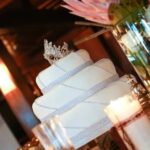Are you looking to impress your guests with a beautifully decorated pound cake? In this article, we will explore how to decorate pound cake and elevate its visual appeal. Pound cake is a beloved dessert that is loved for its rich and buttery flavor, making it the perfect canvas for creative decorations. Whether you are a beginner or a seasoned baker, mastering the art of decorating pound cake can take your baking skills to the next level.
Decorating a pound cake not only adds a visually stunning touch but also enhances the overall eating experience. The process of decorating allows you to showcase your creativity while adding extra flavor and texture to the cake. From simple frosting techniques to intricate designs, there are endless possibilities when it comes to decorating pound cake.
In this article, we will discuss the different types of pound cakes suitable for decoration, essential tools and ingredients needed for cake decorating, as well as basic and advanced decorating techniques. We will also explore creative decorating ideas that will inspire you to personalize your pound cake for any occasion. So let’s dive into the world of pound cake decoration and discover how you can turn a simple dessert into a work of art.
Choosing the Right Pound Cake
Pound cake is a versatile and delicious dessert that can be enjoyed on its own or with added decorations to elevate its appearance and taste. When it comes to decorating pound cake, it’s essential to start with the right type of cake that will hold up well under various adornments. Different types of pound cakes have varying textures and flavors, which can impact their suitability for decoration.
One popular option for decorating is the classic vanilla pound cake, known for its buttery flavor and dense texture. This type of pound cake provides a sturdy base for frosting and decorations, making it an excellent choice for beginners learning how to decorate pound cake. On the other hand, chocolate pound cake offers a rich and indulgent canvas for decorating with colorful frostings, sprinkles, or edible flowers.
For those looking to add a twist to their pound cake decorations, lemon or citrus-flavored pound cakes provide a refreshing and zesty flavor profile that pairs well with fresh fruit garnishes or tangy glazes. Additionally, marble pound cakes offer an eye-catching appearance with swirled vanilla and chocolate batters, allowing for creative decorating techniques such as dual-tone frosting or marbled fondant designs.
Ultimately, choosing the right pound cake for decoration involves considering both the visual appeal and structural integrity of the cake. By selecting a pound cake that aligns with your desired decorative style and techniques, you can ensure a stunning end result that is as pleasing to the eyes as it is delicious.
| Pound Cake Type | Suitability for Decoration |
|---|---|
| Vanilla Pound Cake | Sturdy base for frosting and decorations; suitable for beginners |
| Chocolate Pound Cake | Rich canvas for colorful frostings and edible decorations |
| Lemon/Citrus Pound Cake | Zesty flavor profile perfect for fresh fruit garnishes or tangy glazes |
| Marble Pound Cake | Eye-catching appearance allows creative decorating techniques |
Preparing the Cake
After choosing the right pound cake for your decorating project, the next crucial step is to properly prepare the cake before you begin the decorating process. This involves ensuring that the cake is baked and cooled correctly in order to provide a solid foundation for your decorative elements.
When baking a pound cake, it’s important to follow the recipe carefully and accurately measure all ingredients. Once the batter is prepared, it should be poured into a greased and floured pan of an appropriate size for the recipe. The cake should then be placed in a preheated oven and baked according to the specific instructions provided.
Once the pound cake is fully baked, it should be removed from the oven and allowed to cool in the pan for a period of time specified in the recipe. After this initial cooling period, gently run a knife around the edges of the pan to loosen the cake before turning it out onto a wire rack to cool completely.
It’s crucial that you allow the pound cake to cool entirely before attempting any decorating techniques, as decorating on a warm surface can cause frosting or glazes to melt or become runny. This also ensures that any decorations applied will adhere properly and not slide off due to warmth.
Essential Tools and Ingredients
Decorating a pound cake can turn a simple dessert into an eye-catching and delicious masterpiece. To achieve stunning results, it is essential to have the right tools and ingredients on hand. Whether you are a beginner or an experienced baker, having the necessary items at your disposal can make all the difference in creating a beautifully decorated pound cake.
One of the most important components of cake decorating is the frosting. Different types of frosting can be used to achieve various effects, from smooth and glossy finishes to intricate designs. Some popular choices for decorating pound cakes include buttercream frosting, cream cheese frosting, and fondant. Each type has its own unique texture and flavor, allowing for endless creativity when it comes to decorative options.
In addition to frosting, other essential tools for decorating pound cakes include piping bags and tips. These items are crucial for achieving precise designs and creating elegant borders or patterns on the cake’s surface. Piping bags can be filled with different colored frostings or icings to add visual interest and detail to the overall presentation of the pound cake.
Furthermore, edible decorations such as sprinkles, edible glitter, chocolate shavings, and fresh fruit can also elevate the appearance of a pound cake. These decorations add not only color but also texture and flavor to the finished product. With so many options available, there are endless possibilities for how to decorate pound cakes that will cater to any individual’s taste preferences.
When it comes to decorating a pound cake, having the right tools and ingredients is vital in achieving professional-looking results. From frostings and piping bags to edible decorations, each item plays an important role in adding beauty and flavor to the finished product.
| Tools/Ingredients | Description |
|---|---|
| Frosting | Different types like buttercream frosting, cream cheese frosting, fondant |
| Piping Bags & Tips | Used for precise designs and creating elegant borders or patterns |
| Edible Decorations | Sprinkles, edible glitter, chocolate shavings, fresh fruit |
Basic Decorating Techniques
Decorating a pound cake can be a fun and creative process that allows you to personalize your dessert for any occasion. Whether you’re planning to serve it at a birthday party, holiday gathering, or simply as a sweet treat for yourself, knowing how to decorate pound cake can elevate its appearance and make it even more enticing.
In this section, we will explore some basic decorating techniques that are simple and beginner-friendly, perfect for those who are new to cake decorating.
Frosting
One of the most classic and versatile ways to decorate a pound cake is through frosting. Buttercream frosting is a popular choice due to its smooth and creamy texture, making it easy to spread and work with.
You can use a spatula or icing smoother to create an even layer of frosting on top of the cake, or get creative with different piping tips to add decorative designs. For those looking for a lighter option, whipped cream frosting is also a great alternative that pairs well with fresh fruits or berries.
Piping
Piping is another technique that can add visual interest and flair to a plain pound cake. With the use of piping bags and various tips, you can pipe intricate patterns, borders, or even write personalized messages onto the cake. Practice using different piping tips such as round tips for creating dots or stars, leaf tips for adding foliage details, and petal tips for making floral decorations.
Glazing
Glazing is a quick and easy way to add flavor and visual appeal to your pound cake. A simple powdered sugar glaze made with confectioners’ sugar and milk can be drizzled over the top of the cake for an elegant finish. You can also experiment with flavored glazes by adding extracts or citrus zest for an extra burst of taste. Additionally, colored glazes can be used to create vibrant decorations or marbled effects on the surface of the cake.
Learning how to decorate pound cake with these basic techniques is just the starting point for unleashing your creativity in the kitchen. Experimenting with different flavors, colors, and textures will allow you to customize your pound cake decorations according to your preferences and imagination.
Advanced Decorating Techniques
When it comes to taking your pound cake decorating skills to the next level, advanced techniques such as fondant work, chocolate garnishes, and intricate designs can truly elevate the presentation of your creation. These methods allow for more detailed and professional-looking decorations that are sure to impress anyone who sees, and tastes, your pound cakes.
Fondant Work
Fondant is a versatile and pliable ingredient that can be rolled out and used to cover the entire pound cake or create decorative shapes and figures. To use fondant, start by rolling it out on a clean surface dusted with powdered sugar to prevent sticking.
Once rolled to the desired thickness, gently lift the fondant over the cake and smooth it down using a fondant smoother tool or your hands. Fondant can also be dyed with food coloring to achieve various colors for creative designs.
Chocolate Garnishes
Using chocolate for decorations is another sophisticated way to enhance the look of your pound cake. You can create chocolate curls, shavings, or intricate designs using melted chocolate in a piping bag. For example, drizzling melted chocolate over the top of the cake in a decorative pattern or creating delicate chocolate flowers can add an elegant touch to the presentation.
Intricate Designs
For those who have mastered basic piping techniques, creating intricate designs with frosting on pound cakes is a true art form. Using different piping tips and techniques, you can pipe elaborate patterns, lace-like details, or even 3D elements onto the cake’s surface. This level of decoration requires patience and practice but can result in stunning and visually appealing finishes that truly showcase your decorating skills.
These advanced decorating techniques may seem intimidating at first but with practice and patience, anyone can master them. Whether you choose fondant work, chocolate garnishes, or intricate designs with frosting, these techniques are sure to make your pound cake stand out at any event or gathering. With dedication and creativity, you can develop your own signature style for decorating pound cakes that will leave a lasting impression on all who indulge in your delicious creations.
Creative Decorating Ideas
When it comes to decorating pound cake, the possibilities are truly endless. From simple designs to intricate details, there are countless creative and innovative ways to make your pound cake stand out. Whether you’re looking to celebrate a special occasion, showcase your baking skills, or simply add a personalized touch to your dessert, there are plenty of options to explore.
Themed designs are a fun and exciting way to decorate pound cake. Whether you’re planning a birthday party, baby shower, or holiday gathering, themed designs can help tie the dessert into the overall event theme. Consider using colorful frosting and edible decorations to create shapes and designs that reflect the occasion. For example, for a child’s birthday party, you could decorate the pound cake with vibrant icing in the shape of their favorite cartoon character or animal.
Seasonal decorations offer another great opportunity for creative pound cake decorating. From spring florals to winter wonderland scenes, there are endless possibilities for incorporating seasonal elements into your design. Use fresh fruits and flowers for spring and summer cakes, while autumn leaves and cozy winter motifs can add warmth to cold-weather desserts.
Personalization options are also an excellent way to make your pound cake decoration unique. Consider incorporating personalized messages or monograms using letter-shaped cookie cutters or edible markers. You can also customize the color scheme and design elements to reflect the recipient’s favorite colors or hobbies.
No matter what type of decoration you choose, always remember that practice makes perfect. Experimenting with different techniques and designs will help you develop your own style and become more confident in your decorating skills. So go ahead and have fun exploring new creative ideas for decorating pound cake.
Troubleshooting and Tips
In conclusion, decorating a pound cake can be a fun and rewarding experience for any baker. Whether you are a beginner or an experienced cake decorator, there are endless possibilities for creating beautiful and delicious works of art with a pound cake as your canvas. By choosing the right pound cake, preparing it properly, using the essential tools and ingredients, and learning both basic and advanced decorating techniques, you can elevate your cakes to new heights.
One of the key takeaways from this guide is that decorating a pound cake does not have to be intimidating or complicated. With the right knowledge and practice, anyone can create stunning designs that will impress friends and family.
From simple frosting and piping techniques to more intricate fondant work and chocolate garnishes, there is a wide range of options to explore. Additionally, by incorporating creative decorating ideas such as themed designs or seasonal decorations, you can infuse personality and flair into your cakes.
Lastly, it is important to remember that troubleshooting common decorating issues is all part of the learning process. As with any new skill, there may be challenges along the way, but with perseverance and the helpful tips provided in this article, you can overcome these obstacles and improve your overall cake presentation.
So why not try your hand at decorating a pound cake today? With dedication and creativity, you may just discover a newfound passion for cake decorating that will allow you to delight others with your delectable creations.
Frequently Asked Questions
How Do You Make a Bundt Cake Look Pretty?
Making a Bundt cake look pretty involves several techniques. One way is to ensure that the cake is completely cooled before adding any decorative elements, such as a dusting of powdered sugar or a drizzle of glaze.
Using fresh fruits, edible flowers, or even some simple icing can also enhance the visual appeal of the cake. Additionally, choosing a visually appealing Bundt pan with intricate designs can create an eye-catching finished product.
What Is the Secret to a Good Pound Cake?
The secret to a good pound cake lies in achieving the perfect balance of key ingredients – butter, sugar, eggs, and flour. Creaming the butter and sugar properly is crucial for creating a light and airy texture.
Additionally, using high-quality ingredients such as pure vanilla extract and real butter can greatly enhance the flavor of the pound cake. It’s also important to not overmix the batter to prevent toughness in the final product.
How Do You Keep a Pound Cake From Sticking to the Pan?
Preventing a pound cake from sticking to the pan starts with proper preparation before pouring in the batter. Greasing and flouring the pan thoroughly is essential to create a barrier between the cake and the pan’s surface.
Allowing the pound cake to cool in the pan for just 10-15 minutes after baking helps it set and makes it easier to release from the pan without sticking. Choosing a quality non-stick Bundt pan can also help ensure that your pound cake comes out smoothly every time.

Welcome to our cake decorating blog! My name is Destiny Flores, and I am the proud owner of a cake decorating business named Cake Karma. Our mission is to provide delicious, beautiful cakes for all occasions. We specialize in creating custom cakes that are tailored specifically to each customer’s individual needs and tastes.





